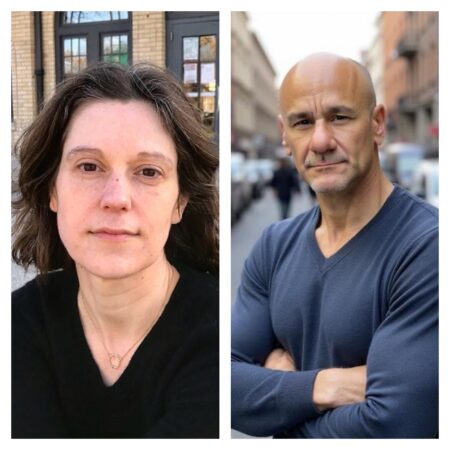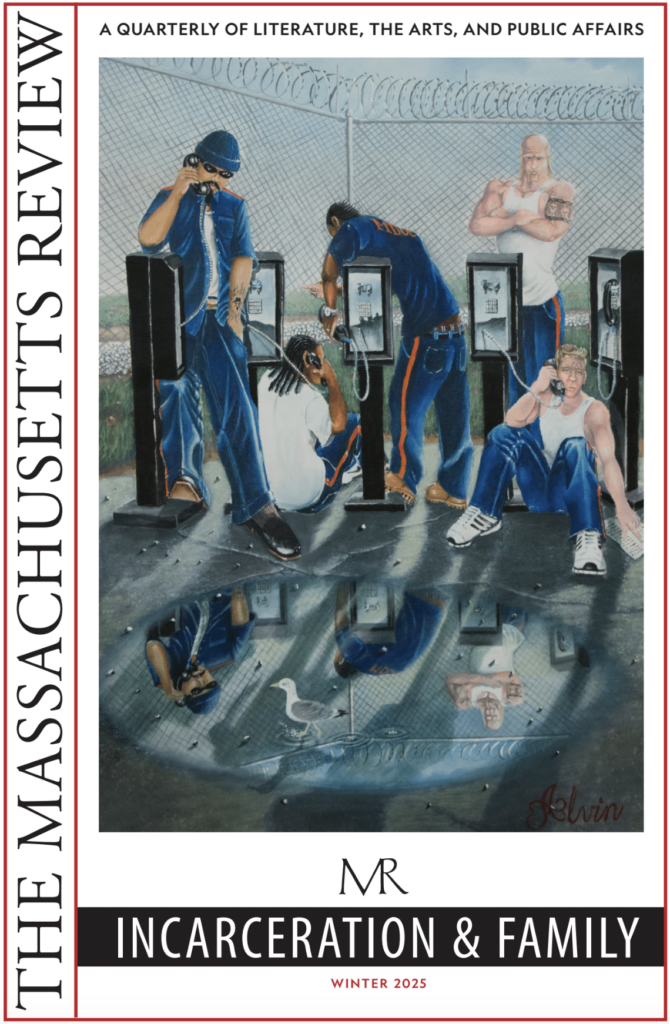10 Questions for Elton Uliana and Amanda Sarasien

“She woke up so happy. One of the nuns opened the bedroom door and crossed the narrow aisle between the beds. As the day’s first gentle sounds touched the silence—the door opening, the thin rubber soles on the wood parquet—some of the women woke up. Leaning slightly to-ward the window, the nun raised the blinds.”
—from Elton Uliana and Amanda Sarasien’s translation of José Luís Peixoto’s “The Woman Who Dreamed,” Volume 66, Issue 2 (Summer 2025)
Tell us about one of the first pieces you translated.
Elton Uliana: My first published translation which I am extremely fond of is a story called “Flakes” by Ana Maria Machado, a beautiful tale of memory, family relations and death. The story slowly and tenderly explores the relationship between a grandmother and her grandchildren. It is dense with cultural references and includes complex wordplay, which can present interesting challenges. I was privileged enough to be able to collaborate in person with Machado, who was giving a talk at the time to students at UCL in London, where I was completing my master’s degree in Translation Studies. Machado is one of Brazil’s most celebrated children’s writers and an accomplished translator herself, so her insights were enormously valuable. As part of the process, I had the opportunity to write a translator’s note providing further perspective and reflection on my translation method, something that I enjoyed very much.
Amanda Sarasien: For a practicum on literary translation in grad school, I chose a nineteenth-century Brazilian author called Artur Azevedo whose work is in the public domain. He wrote comedy-of-manners stories—we might even call them microfictions—funny and trenchant studies of class, bureaucracy, religion, and society. A few of my translations were published.
What writer(s) or works have influenced the way you write now?
E.U.: I have always been highly influenced by the work of José Saramago and his particular oral technique, renowned for its capacity to incorporate the verbal qualities of day-to-day speech into a highly rhetorical, absorbing and digressive prose. I have completed most of my academic education as a mature student in England, and from day one I fell in love with Virginia Woolf and James Joyce. They are both pivotal figures in my literary career, influencing not only the way I read and write but also my whole conception of how literary representation works in relation to reality.
A.S.: So many—Ali Smith, Clarice Lispector, Maggie Nelson, Joan Didion, Elizabeth Hardwick, Jenny Offill, Barbara Comyns, Hilary Mantel, Poupeh Missaghi, Jane Gardam, José Saramago, Max Porter, Susan Bernofsky’s translations of Jenny Erpenbeck and Yoko Tawada, Gini Alhadeff’s translations of Fleur Jaeggy, and really every writer I’ve ever translated.
What other professions have you worked in?
E.U.: I worked in sales and retail in Brazil prior to moving to the UK in 1999, and as a public service interpreter in my early days in London. I then worked with technical and academic translation for a number of years. I often teach translation theory for undergraduate students at UCL as a guest lecturer, something that I find incredibly rewarding. I am currently working as Communications and Engagement Coordinator for a British environmental think tank, with a specific focus on Brazil.
A.S.: Before becoming a translator, I had a career in manufacturing: I mostly worked in sales support and marketing for various companies, from a defense contractor to a paintball manufacturer, using my language skills to help them sell their products overseas.
What did you want to be when you were young?
E.U: I have always loved music and I’m one of those people that sings all the time in the shower at home and often when I’m out waking my dog. My dream was always to become a singer.
A.S.: My earliest aspiration was to be a writer. But around middle school, I began to feel a literary life was out of my reach. I’d been teaching myself other languages and engaging in what I now see was a sort of proto-translation into those languages as a means of practicing what I’d learned. I thought then that I wanted to be an interpreter. Now that I’ve stumbled into literary translation it’s as though I’ve come full circle.
What drew you to write a translation of this piece in particular?
E.U.: Many years ago in Portugal when a book seller in Sintra recommended Uma casa na escuridão by Peixoto (in English A House in Darkness, trans. by Daniel Hahn), the whole book blew me away. It remains one of my favourite books. Subsequently, I had the pleasure to meet Peixoto in person on various occasions, and he encouraged me to translate his work. By serendipity, I discovered “The Woman Who Dreamed,” the story completely enchanted me and because I have an exciting and productive working relationship with Amanda Sarasien—an extraordinary literary stylist in her own right—I invited her to collaborate with me.
A.S.: When Elton approached me with the idea of translating this piece, I couldn’t believe my good fortune. I’d always admired José Luís Peixoto; ever since I’d first read Richard Zenith’s translation of The Implacable Order of Things, I’d thought he had such a distinctive voice that really didn’t get its due in English translation–it’s haunting and incantatory and really teases out the beauty in the minutest details of the world around us. Never did I dream I’d get the chance to actually translate him: I was so grateful for the opportunity, both to work on this author and to collaborate with Elton, who has such an eye for lyrical prose.
Is there a city or place, real or imagined, that influences your writing?
E.U.: My hometown Porto Alegre in south Brazil has always been the city of my verses, my poetic root. The cartography and psychogeography of the city have also informed narratives by a new generation of contemporary writers who are obtaining significant international recognition, like for example Paulo Scott’s Phenotypes— longlisted for the International Booker Prize and translated into English by Daniel Hahn, largely set in Porto Alegre. Other novels include Daniel Galera’s The Shape of Bones, translated by Alison Entrekin, and Michel Laub’s Diary of the Fall, translated by Margaret Jull Costa.
Is there any specific music that aids you through the writing or editing process?E.U.: Despite my passion for music, I can only write or do editorial work in complete silence. However, I am often energised in between work by listening to world music (Brazil, Argentina, Greece, Portugal). To clear my mind and relax I listen to music from classical ballet (I particularly love Tchaikovsky’s Sawn Lake, Max Richter’s Infra and Erik Satie’s Gnossiennes).
Who typically gets the first read of your work?
E.U.: My best friend and most perceptive linguistic advisor, Duane.
A.S.: I often read aloud to my husband, my dog, or myself, just to hear the rhythm of the sentences and determine where I can improve the flow.
If you could work in another art form, what would it be?
E.U.: I would love to work as a dramaturg on a ballet adaptation of a novel, similar to the Royal Ballet’s Woolf Work’s, a haunting and evocative interpretation of Virginia Woolf’s literary world
A.S.: I do work in another art form! I’m a visual artist currently working in collage and encaustic. I’d love to get more into printmaking.
What are you working on currently?
E.U.: I am preparing a collection of plays by Howard Barker for a Brazilian publisher, one the most provocative and fascinating British living playwrights.
A.S.: I’m pitching a few sample translations to publishers, including a Brazilian novel about motherhood, art, and doppelgangers; and a French autofiction from the 1960s. I’m also seeking a publisher for a manuscript of my own writing, a hybrid memoir/essay on the intersections of language, disability, translation, body, time, and narrative authority.
ELTON ULIANA is a Brazilian writer, literary critic, and translator based in London. He is the co-editor of the Brazilian Translation Club at University College London (UCL). His work has been featured in the Oxford Anthology of Translation, Latin American Literature Today, Art in Translation, Asymptote, Tablet, Alchemy Journal of Translation, West Branch, and Your Impossible Voice, as well as in the anthologies Daughters of Latin America: An International Anthology of Writing by Latine Women(Harper Collins) and Afro-Brazilian Short Fiction: A Bilingual Anthology (UCL Press).
AMANDA SARASIEN is a writer and translator working from Portuguese and French into English. A recipient of a National Endowment for the Arts Translation Fellowship, her work has appeared in The Common, West Branch, Chicago Review of Books, Electric Literature, and elsewhere. She is past co-chair of the PEN America Translation Committee and lives in Chicago.



